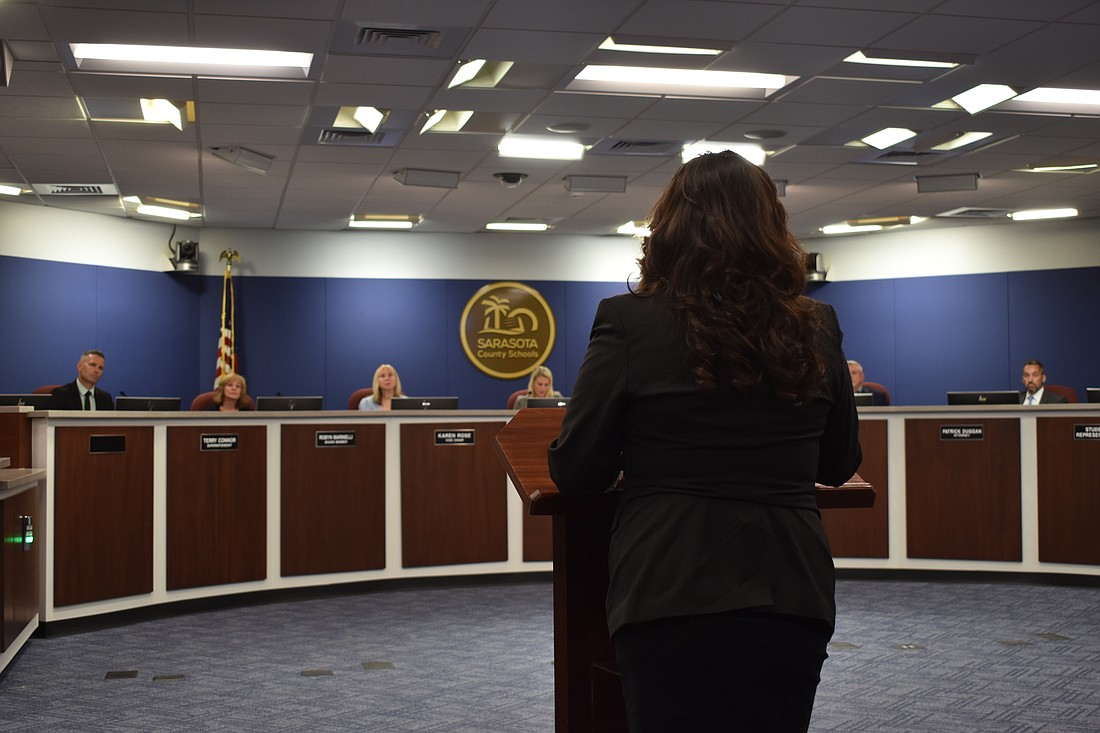- July 26, 2024
-
-
Loading

Loading

As the Sarasota County School Board convened to approve its tentative budget and new millage rates, discussion turned to social-emotional learning and whether the education method was promoted in the budget.
The board approved the proposed budget of about $1.55 billion, and the proposed millage of 2.932 in support of the budget, through votes of 4-1 for each. Board Chair Bridget Ziegler dissented on both items.
Following a July 24 meeting that saw the approval of the budget and millage for advertising, the budget was updated with revised language that excluded, among other wording, reference to social-emotional learning, a teaching method opposed by conservatives and prohibited at the state level.
The board also decided to hold a vote on the district’s strategic plan during its next meeting, which the district website shows as taking place Aug. 15, in order to ensure the language in that document is also up to date.
Superintendent Terry Connor and School Board attorney Patrick Duggan said the budget had always been in compliance with state law, but the revisions brought outdated language into compliance as well.
The concern was a budget line item of about $57 million that was originally labeled as providing funding to “enhance social-emotional learning and supports provided to students to promote belonging, dignity and inclusion." But that was revised, with those terms being eliminated.
Connor said the original verbiage reflected language from the draft strategic plan of September 2021, which had been incorporated into the software used to design the budget due to a request that the budget incorporate strategic planning goals. Revisions had also been made to the language in 2022.
Connor offered a breakdown of the funding assigned to that item, which is Strategy 2A in the section "Personalize learning and accelerate growth for ALL students."
He said it included $44.5 million in positions involving exceptional student education, English speakers of other languages, certified school counselors, regular classroom support, and other items, along with $13 million for community service and other items.
Revisions were also made to other aspects of the budget, including an accompanying item in the same section, Strategy 2B, which Connor also highlighted.
Some board members said the idea that the budget included social-emotional learning was “misinformation."
While the majority of the board agreed to approve the budget, saying the approval was tentative and revisions were still possible, Ziegler said the district needed to ensure how the budget would be implemented in practice.
Vice Chair Karen Rose expressed confidence in the budget and process.
“I want our staff, teachers and schools to be able to go forward,” she said. “I have confidence that with the structures that Mr. Connor has already put in place in 10 days on accountability for our curriculum, and following the mandates that have come out through the legislature curriculum-wise, and a system of accountability, that we will be in compliance.”
Board member Tom Edwards said he was less concerned with the definition of social-emotional learning than he was with academic achievement.
“Here we are back again, discussing the boogeyman called woke,” he said.
Edwards concluded his comments by stating that the while improvement was possible, he was satisfied with the overall results.

“We did a heck of a good job on this budget, and there are plenty of new ideas and suggestions that Mr. Connor can take and run with and improve in that continuous improvement model,” he said. “So, board, staff, community: it’s a good budget.”
Ziegler said she wanted to look deeper into what the changed language means in practice.
“We've got to be very strategic and focused on this and be honest about it,” she said. “If I'm the only one up here that thinks that, so be it, but that's not something that I'm going to walk back on. I’m going to continue to bring it up. I know it's something we've talked about in the past, and it concerns me that we don't really know what we're changing.”
Board member Lisa Marinelli said she supported the budget due to its potential for revision.
“We know, I know there are issues, but it won’t be done overnight. All I’m asking is give this man time to find it, and get it cleaned up, because I believe he will,” she said.
Board member Tim Enos likewise said he supported the budget and millage, as the meeting concerned a tentative approval. He said the district still needed to ensure it was in full compliance with state law.
Rose also made a motion for the board to vote at the next meeting, shown on the district website as Aug. 15, on whether to place its strategic plan on hold. She said the plan still needed review to ensure it was up to date. The motion passed unanimously.
Edwards said he was skeptical of the wording of the motion, but voted in its favor, saying part of the school district's natural process involves revising the strategic plan.
Some commenters praised the district’s work on the budget, while others decried what they said was funding allocated to social-emotional learning.
“These are required expenditures in order to narrow the achievement gap and support our teachers and improve student outcomes, priorities that are shared by our entire community,” said Liz Barker. “As a community, we reject any attempt to distract, deflect and divide us as we work toward our shared mission and prioritization of student achievement and success.”
Juliet Barrett said the change of the language was not sufficient, calling some of the remaining programs "social-emotional learning."
“In the mental health allocation plan, you use zones of regulations, use positive behavioral interventions and supports, and you use WhyTry,” she said. “All of these are radical, SEL programs, and so you sit here and say, well, we could change the language, because people don't like the way SEL sounds.”